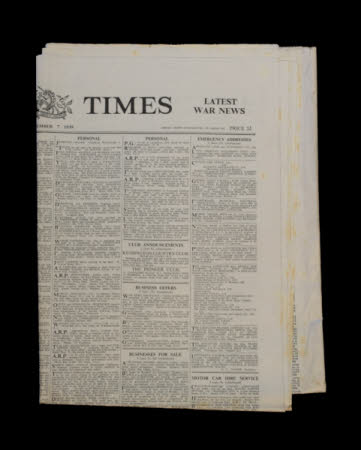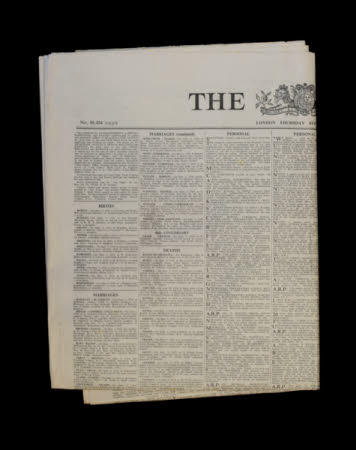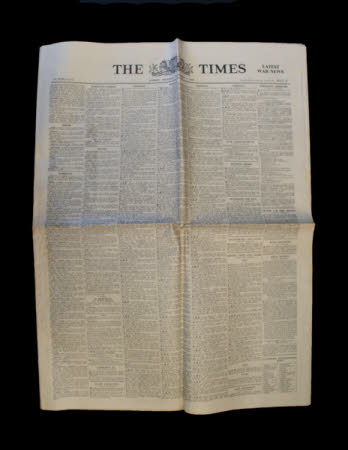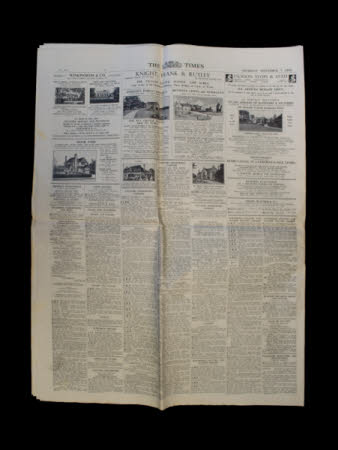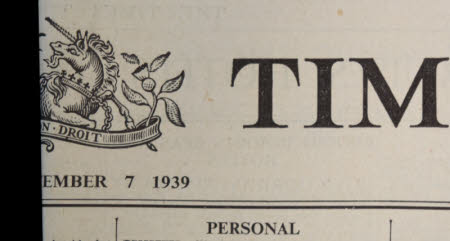The Times
The Times
Category
Books
Date
7 Sep 1939
Materials
Newspaper
Measurements
325 x 254 x 5 mm
Order this imageCollection
Mr Straw's House, Nottinghamshire
NT 748899.6
Summary
The fourth in a sequence of whole newspapers, The Times 'THURSDAY SEPTEMBER 7 1939'. The top sheet as the papers are wrapped has a series of advertisements, 'PERSONAL', 'PERSONAL' and 'EMERGENCY ADRESSES' alongside others. In the top right corner the headline 'LATEST WAR NEWS'. The newspapers in the package are; Daily Mail 26 May 1949 (wrapping) Daily Mail 30 July 1941 (scraps) The Times 4 September 1939 The Times 5 September 1939 The Times 6 September 1939 The Times 7 September 1939 The Times 8 September 1939 The Times 9 September 1939 Worksop Guardian 17 May 1940. Friday 1 September 1939 at 0445 hours German forces invade Poland without a declaration of war. The operation is code named Fall Weiss (Plan White). The Germans allot 52 divisions for the invasion (some 1.5 million men), including the 6 armoured divisions and all their motorized units. Of the divisions left to defend against an Anglo-French front, only about 10 are regarded by the Germans as being fit for any kind of action. In London the British government demands a German withdrawal from Poland. Because of the fear of air attacks, the evacuation of young children from London and other supposedly vulnerable areas is begun. General mobilization is proclaimed. (The Royal Navy was mobilized on August 31st.) Air Raid Precautions (ARP) are introduced and a "blackout" enforced from sunset. British railways are taken under government control. Thursday 7 September 1939 French launch offensive in the Saar, French patrols cross the frontier into Germany near Saarbrucken, marking the beginning of the Saar offensive. A total of 11 divisions advance along a 32 km frontage. There is negligible German opposition. The French mobilization is too slow and their tactical system too inflexible to permit any grander offensive operation. These gentle probes continue until September 17th when a larger advance is supposed to be made but is in fact cancelled because the Polish collapse makes it pointless. In Berlin Hitler meets with Admiral Erich Raeder, Commander-in-Chief of the Kriegsmarine, and orders that "in order not to provoke neutral countries, the United States in particular, it is forbidden to torpedo passenger steamers, even when sailing in convoy. Warfare against French merchant ships, attacks on French warships and mine laying off French ports is prohibited." The order is in response to the sinking of the Athenia. In Germany the death penalty is decreed for anyone "endangering the defensive power of the German people.". In London General Viscount Gort, VC, is appointed to command the British Expeditionary Force.
Provenance
Straw collection bequeathed to the National Trust on the death in 1990 of William Straw.
Makers and roles
The Times, printer and publisher
